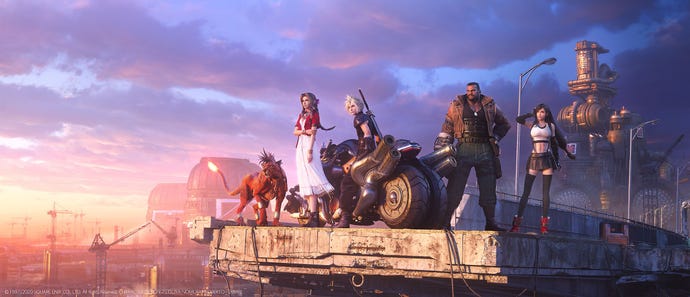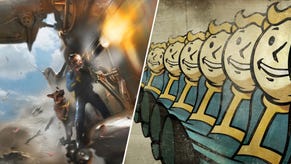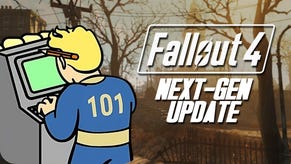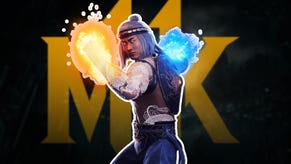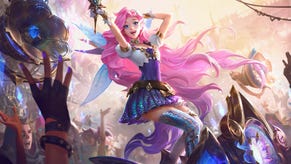Final Fantasy 7 Remake makes big changes that worry fans, but that's okay
Final Fantasy 7 Remake isn't just about remaking a classic game, despite the name. It's about recontextualizing an entire beloved world.
This article will remain spoiler-free from specific details, but will discuss the broad strokes of Final Fantasy 7 Remake's approach to narrative. The spoiler sensitive should come back later.
Final Fantasy 7 Reimagined is undoubtedly a less snappy title than Final Fantasy 7 Remake, but it's probably actually a more evocative title to summarize this game that fans have waited so long for. To reimagine and recontextualize is what this game does; it is its raison d'être. It extracts the content from the original game and uses it in an entirely different context. Sometimes that leads to scenes playing out exactly as you remember them, others it leads to minor changes and additions, and sometimes it leads to things being significantly different.
The response to this has naturally been mixed. Some fans, like myself, have been quite happy with the idea. Kirk's feelings were mixed, as detailed in our spoiler-filled ending discussion. Others are less torn and much less happy; I've read plenty of forum posts and twitter diatribes over the last few days from fans who are deathly, seriously upset. But I don't think they need to be. The changes are okay. In fact, I'd argue, they're wholly necessary.
Where Resident Evil 2 and 3 have tried to sell themselves as a more straight-up remake of a PS1 classic, the team behind FF7R, a mix of those who worked on the original game and younger staff who remember playing it with slack-jawed glee, clearly know it is impossible to make Final Fantasy 7 again. The weird and wonderful 'do what you want' development environment that existed for the original FF7 can't exist in a modern big budget development pipeline, for one. The world has changed, too - players know these characters and their stories, making brilliantly paced twists and surprises obsolete. In a more serious vein the optics of telling a story where the leads start out as lovable insurgents and terrorists has undoubtedly shifted after over the last two decades.
Probably most important, as ever, are the people. Square Enix has made much of the fact that many of the original staff are returning for the remake, but these developers are still older, different people, no doubt softened in places, hardened in others and generally molded by the ebb and flow of life over the last 23 years. They have gone from reckless young upstarts chasing Dragon Quest to industry leaders and elder statesmen.
Perhaps these things are what led the developers to their conclusion that merely making what they already did before again would be boring, even if they built it around modern gameplay systems. So in places, they take a turn. In some areas that turn is much sharper than in others.
That shift in context is important, and FF7 Remake's marketing hasn't been entirely up-front in this sense, likely thanks to a combined fear of spoilers and driving potential buyers away. This isn't because FF7 Remake only covers the Midgar section of the original story - that was made quite clear. But by the end of the game small but significant changes to events will stack up to mean that the status quo and tone at the end of FF7 Remake is very different to that in the original game when you first step out of Midgar.
The flip side is that in many ways the title now makes more sense. Resident Evil 2, a very faithful, near beat-for-beat recreation of the original. To many the word remake evokes the idea of making the same thing again, but the Oxford English Dictionary denotes that the word remake can also mean to make something differently. Had this been as faithful as Resident Evil's take, perhaps it would've just been called Final Fantasy 7: Part 1.
I am braced for this debate to continue to flare online in the coming weeks. When a work is completed, one can argue it ceases to be the property of its creator and becomes the property of its fans. That concept is even more fiercely true for a property as beloved as FF7. Final Fantasy 7 Remake is the development team at Square Enix asserting its ownership over these classic characters, their world and their story. This has happened before with the Compilation of Final Fantasy 7 prequel and sequel works, but fans had a get-out clause with those projects. Siloed off from the core game, they could ignore the additions if they wanted. As a retelling of the events they love and the new tentpole production of the FF7 world, Remake isn't so easily dismissed.
While some fans are inevitably going to feel short-changed and frustrated with any one of the changes - though some more than others - I have to say I respect the decision that Yoshinori Kitase, Tetsuya Nomura and their team have made. To uncurl the deadlock grip fans try to take of characters and a story like this to do something bold and different takes balls, especially when elements of the reaction are practically guaranteed to never be pretty.
And honestly, what is the alternative? A tepid, safe retread remake that offers little new other than prettier visuals like Disney's 2019 Lion King do-over? Resident Evil got away with such a simple remake approach in part because of what a brisk rollercoaster that game is and also in part because of how much the horror genre can gain from a perspective switch and more realistic depiction. I'd argue that for a thirty-hour RPG that hopes to set up an entire series of games, something more was arguably required. For good or for ill, the later hours of FF7 Remake deliver on that something more in spades. Even if it goes off the rails while travelling in a radically different direction in the future, this will have been worthwhile.
This is my take, and I perhaps am less disappointed by changes because I was less interested in a remake in the first place, preferring to see FF do something new. But even so, to the angry fans already screeching about the changes I say: try to chill your beans. This is a new story and a reinvention - and what else is Final Fantasy meant to be about more than reinvention? The series now no longer one-shots its worlds and characters - in fact, it constantly revisits them. But this visitation is at least prepared to hold firm with the spirit of the series by doing things differently.
The greatest gift of all is that we still have the original game. Perfect then, and still fabulous now - utterly unchanged, and just begging to be played. Still.
